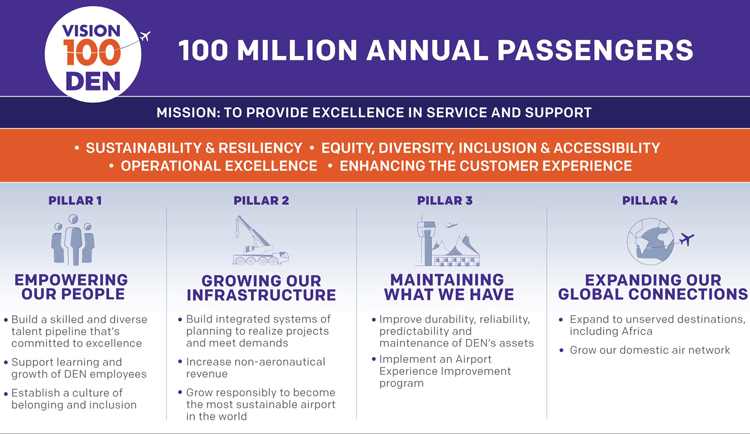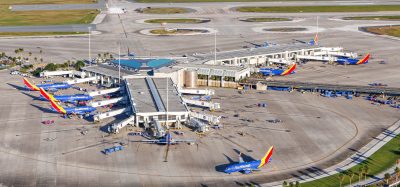Preparing for the future of travel at Denver Airport
Posted: 25 October 2024 | Holly Miles | 2 comments
In an exclusive interview with Holly Miles, Editor of International Airport Review, Phillip Washington, CEO of Denver International Airport (DEN), sheds light on the airport’s recent achievements and ambitious future plans. From record-breaking passenger numbers to innovative security measures and sustainability goals, Denver Airport is gearing up for a transformative future in air travel.


Record-breaking passenger traffic
In 2023, Denver International Airport set an all-time passenger traffic record, surpassing 78 million passengers. Washington attributes this significant growth to several key factors, including infrastructure expansion, regional population growth and competitive operational costs.
“We have had a dramatic increase in passenger volume and traffic,” he noted. “For every month in 2023, we set a record. To accommodate that growth, we built 39 new gates and finished them in record time. We’re also expanding the existing terminal, known as the Great Hall, to manage the increased numbers.”
The growth of the Denver metro area has played a crucial role as well. “The Denver metro area has grown by about 70% since the opening of the airport,” Washington explained. “Our cost per enplanement is relatively low compared to other airports, which attracts airlines to create new routes and utilise Denver for increased passenger loads.”
Join our free webinar: Revolutionising India’s travel experience through the Digi Yatra biometric programme.
Air travel is booming, and airports worldwide need to move passengers faster and more efficiently. Join the Digi Yatra Foundation and IDEMIA to discover how this groundbreaking initiative has already enabled over 60 million seamless domestic journeys using biometric identity management.
Date: 16 Dec | Time: 09:00 GMT
rEGISTER NOW TO SECURE YOUR SPOT
Can’t attend live? No worries – register to receive the recording post-event.
Denver’s strategic location as a central hub in the United States has also contributed to its growing significance. Airlines find it an attractive hub for connecting flights, increasing both domestic and international passenger traffic. Additionally, Denver’s commitment to maintaining competitive operational costs for airlines has made it a preferred choice for new routes and expansions.
Evolving passenger expectations
As passenger numbers soar, their behaviours and expectations are also evolving. Washington highlighted the need for short security queues, more concessions, attractive spaces and family-friendly areas such as children’s play zones.
“Passengers expect more concessions and we are building to accommodate those new gates,” he said. “We are also looking to build children’s play areas to enhance the overall passenger experience.”
In response to these changing expectations, Denver Airport is investing heavily in improving its amenities and services. This includes expanding retail and dining options to offer a wider variety of choices for travellers. The goal is to create a more enjoyable and convenient airport experience, catering to the diverse needs and preferences of passengers.
Moreover, the airport is focusing on enhancing the aesthetic appeal of its terminals. Washington emphasised the importance of creating a welcoming and visually pleasing environment. “Attractive spaces make a significant difference in how passengers perceive their time at the airport. We want to provide a comfortable and enjoyable atmosphere for everyone.”
Vision 100 and Operation 2045
Denver Airport’s ambitious growth plans are encapsulated in the Vision 100 initiative, which aims to accommodate 100 million annual passengers by as soon as 2027. This will be followed by Operation 2045, preparing the airport for 120 million passengers by 2045, which also happens to be the airport’s 50th anniversary.
“The airport was originally designed for 50 million annual passengers,” Washington explained. “Originally we anticipated hitting the 100 million passenger mark by 2032, we have now forecast that this could be as soon as 2027, necessitating an acceleration of our build-out plans. Vision 100 focuses on accommodating these higher numbers, and Operation 2045 will lay the foundation for even more future growth to 120 million.”
This foundation includes new processing facilities and additional walkable concourses to manage the increasing passenger load. “Our economic impact is already the largest in Colorado at $36.4 billion annually. When we reach 100 million passengers, we will generate about $71 billion annually,” Washington emphasised.


Vision 100 c: DEN
Advanced security technology
In February 2024, Denver Airport opened a new West Security Checkpoint featuring advanced technology that significantly enhances efficiency. Passengers can now leave liquids and laptops in their bags, and the bins return automatically to the front of the line.
“The throughput increased from 150 passengers per hour per lane to around 240 passengers per hour per lane,” Washington noted. “This new technology allows us to process multiple passengers simultaneously, reducing wait times. We plan to open an East Security Area that will mirror the West, further improving efficiency.”
The implementation of this advanced security technology is part of Denver Airport’s broader commitment to enhancing passenger convenience and safety. By leveraging cutting-edge solutions, the airport aims to streamline the security process and minimise the time passengers spend in lines.
Commitment to sustainability
Denver Airport is dedicated to becoming the greenest airport in the world, with electrification playing a pivotal role in this vision. Recently, the airport received $300,000 in federal funding for an electrification master plan.
“We are electrifying our fleet and installing EV technology across our facilities, and we are quite ahead of other airports that are looking to transition to EVs,” Washington stated. “This grant is the first of many we hope to receive. We also have one of the largest solar panels of any airport in the country. Essentially, I want to be my own utility company and generate our own power at the airport. I do not want to be dependent on external energy providers. We can then generate revenue by selling power to surrounding areas. When EV comes to fruition we’re going to need a power generation set-up.”
Investing in the future workforce
The Teen Navigator programme, which allows students aged 15 to 18 to volunteer at the airport, is part of Denver Airport’s broader career pathway initiative. This programme aims to create pathways for young people into aviation and general infrastructure careers.
“The Teen Navigator programme is an introduction to the aviation industry, leading to internships and potential employment at the airport,” Washington explained. “I see it as a pipeline from cradle to executive leadership, addressing the critical need for a qualified workforce in aviation and infrastructure.”
Washington emphasised the importance of nurturing the next generation of aviation professionals. “The lack of a qualified workforce is an existential threat for the aviation and general infrastructure industry. Whether it’s trains, ports, public transportation or aviation there is a lack of qualified workforce in these areas which means we have to grow our own in these areas. By investing in programmes like Teen Navigator, we can create a talent pipeline that ensures the future success and sustainability of our airport.”


The airport is focusing on enhancing the aesthetic appeal of its terminals.
c: DEN
Overcoming recruitment challenges
Attracting and retaining a skilled workforce is a challenge, particularly for publicly owned airports like Denver. There are two types of airports in the U.S. says Washington, there are airports which are part of a city and will have the same class and compensation system as the rest of the city that are non-airport departments; and there are airport authorities who can set up their own compensation systems. The CEO suggests that airports such as Denver who are operating as city departments should advocate for their own class and compensation systems to improve recruitment and retention.
“Talk to the mayor and city council about setting up your own class and comp system,” he advises other CEOs. “This could significantly enhance retention and recruitment efforts.”
Washington highlighted the differences between airports that are part of a city and those that operate as independent authorities. “Airports that are part of a city often face limitations in their ability to offer competitive salaries and benefits. By establishing an independent class and compensation system, we can better compete with the private sector and attract top talent.”
The future
As Denver International Airport continues to break records and innovate, its commitment to growth, sustainability, and customer experience sets a high standard for the future of air travel. Under the leadership of CEO Philip Washington, the airport is poised to become a global leader in aviation, setting new benchmarks for passenger experience, operational efficiency and environmental stewardship.
The airport’s Vision 100 and Operation 2045 initiatives highlight its ambitious plans for future growth, while advanced security technology and sustainability efforts demonstrate a commitment to innovation and environmental responsibility. By investing in workforce development and addressing recruitment challenges, Denver Airport is building a strong foundation for continued success.
As the airport prepares for an exciting future, it remains dedicated to providing a world-class travel experience for passengers and contributing to the economic and environmental wellbeing of the Denver metro area and beyond.


c: DEN
Phillip A. Washington is CEO of the Denver International Airport (DEN). Under his leadership, DEN announced the Vision 100 strategy to prepare and improve the airport’s facilities and operations for the anticipated 100 million annual passengers within 10 years. Prior to Washington’s arrival at DEN, he was the CEO of the Los Angeles County Metropolitan Transportation Authority (Metro) from 2015 to 2021. Washington also served as the CEO of Denver Regional Transportation District (RTD) between 2009 and 2015 and worked as the assistant general manager of RTD for nearly 10 years before being named CEO. Originally from the South Side of Chicago, Washington is a 24-year veteran of the U.S. Army, where he held the rank of Command Sergeant Major, the highest non-commissioned officer rank an enlisted soldier can achieve. He retired from active duty, is a disabled veteran and was awarded the prestigious Defense Superior Service Medal for exceptional service to his country. He holds a B.A. in Business from Columbia College, and an M.A. in Management from Webster University.
WATCH NOW ON DEMAND: Enabling checkpoint flexibility with responsible open architecture
Join us for an essential virtual panel supported by Smiths Detection. We will explore how airports can overcome the challenge of mixed vendor systems by adopting a flexible, open approach to checkpoint technology.
This session offers a focused look into achieving efficiency, agility, and future-readiness.
Key learning points
- Understand what to ask during procurement to ensure long-term flexibility and avoid vendor lock-in.
- Learn how centralised image review and flexible algorithm use can help you get more from the technology you already own.
- Strategies to make mixed vendor screening systems work together to improve checkpoint performance and reduce costs.
- See examples of collaborative deployments and the operational agility they enabled.
Register now for expert insights from Los Angeles World Airports, Dutch Ministry of Justice and Security, and Smiths Detection!
Issue
Related topics
Airport development, Capacity, Digital transformation, Green energy, New technologies, Operational efficiency, Passenger experience and seamless travel, Passenger volumes, Security, Sustainability, Sustainable development, Terminal operations, Workforce



















it won’t matter what upgrades they do to the airport if no one can get there because Pena boulevard is only a two or three lane road when there needs to be at least six lanes to get that much traffic to and from the airport
while exponential growth at the airport is anticipated and welcomed, for the future of Denver; the lack of thoughtful planning in infrastructure, surrounding the Airport is abhorrent. The traffic flow hasn’t been upgraded, since its inception! Traffic jams persist, and the city, myopically looks for quick solutions. Aerotropolis cannot happen unless major roadways and access points are invented. Part of their pathways have already been closed off, because they truly never envisioned such growth. Bureaucracy fails again